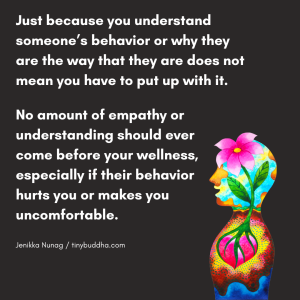
“Love isn’t a state of perfect caring. It is an active noun, like struggle. To love someone is to strive to accept that person exactly the way he or she is, right here and now.” ~Fred Rogers
When you’re depressed, your perception about many things changes—so how does this affect your relationships?
I’m thinking about this today, because—drum roll, please—I’m a little depressed.
Now, I’m not depressed in the suicidal “I want to drive off the road” kind of way, but in the far less dramatic but still deeply unpleasant “mild to moderate” kind of way.
For me, one of the most challenging aspects to feeling like this is that I don’t feel as connected as I normally do—with my friends, the world in general, and with my beautiful, kind, sweet, smart, sexy husband.
And this isn’t specific to me; this is what depression is, a lack of feeling.
When you’re depressed, you can’t access feelings of self-love. And since the love you feel for others is a reflection of the love you feel for yourself, this is why you feel disconnected.
You have an intellectual understanding of the love you have for your girlfriend/mother/sister/boyfriend, but you can’t feel it as much as you normally do.
Years ago, during a time when I was depressed, crying, and unhappy, a friend told me, “I can see you’re still feeling something, so you can’t be too depressed.”
And it’s true. The more depressed you are, the quieter your heart is. It’s like a continuum.
It’s not like you don’t have all the feelings in you; you just can’t feel them right now. Just in case you’re tempted to worry about not having feelings.
And this can be a problem in a relationship. One day you’re connected to yourself, and therefore your partner too, and the next day you don’t feel connected to anything.
When you’re depressed, you misread situations; you perceive others as being critical of you.
But what you’re seeing is a reflection of what you’re thinking about yourself. It’s you that’s being critical of you. Not them being critical of you.
When you don’t understand what happens when you’re depressed and you listen to everything your depressed mind says, you can cause havoc in your relationship.
And this is why, when I’m depressed, I do something I don’t normally do: I keep my feelings to myself. And actually, they’re not my feelings; they’re just some rubbish going through my head, which I misconstrue for feelings.
If I feel irritated or hurt by something I think my husband has done, I don’t tell him.
Here’s an example: My husband says, “Pass me the salt” and I think he’s saying, “You’re a terrible cook,” and get mad at him for being unkind.
But he’s not; he’s just saying, “Pass me the salt.”
The salt scenario is made up, in case you were wondering, but the level of silliness is about right.
But I’m meant to share my feelings, right? Every website about depression I’ve been to says to talk to someone.
Yes. Well, there’s talking and then there’s talking.
Sharing with a loved one and/or health professional that you’re feeling depressed can be hugely helpful, and something I highly recommend.
But that’s another matter entirely from picking a fight over something that wasn’t real in the first place.
Because what’s to be gained by talking about something based on a misperception?
When you have a conversation with a drunk person, you have a drunken conversation; it doesn’t make sense.
And so it is when you talk to a depressed person you have a depressed conversation. And likewise, it’s often not logical.
In fact, depression can be almost as challenging for loved ones as it is for the person who is depressed.
Rather than respond to all the rubbish your mind is telling you, it can be more useful to take a step back and just notice what you’re thinking.
If you want to say something about how you’re feeling, you could say something like, “Oh sweetie, I’m feeling a bit flat tonight. My mind has some strange thoughts going through it. And I miss feeling connected with you.”
And when they ask what they are, don’t tell them.
No way.
I usually say something like, “Let’s not go into it. I’m pretty sure my head’s a little twisted right now, but if there is something to talk about, let’s do it when I’m feeling better.”
And do you know what? On the odd occasion where there is something to talk about, if I wait until I’m feeling better, its no big deal: I talk, he listens, we both talk, and done. That kind of conversation is just not possible for me when I’m feeling flat.
And then we cuddle. Because I like cuddling.
Result: You and your partner have some level of connection, you’ve honored your “flatness” by accepting it, and you’ve avoided a silly discussion based on a misperception.
But what if this isn’t just me being depressed; I mean, I shouldn’t tolerate being treated badly, right?
Your mind may try to convince you that this incident you’re so mad about must be sorted out immediately. But before you do, ask yourself, is there a chance I’m a little flat?
Because if you are, there’s a good chance you’re reading the situation incorrectly.
A while ago I went out with a couple of friends. At the end of the evening, one friend took me aside and said, “Wow, Greg is being so critical tonight.”
Which seemed strange to me, since he was the one being critical. He thought Greg was critical of him, when really it was him being critical of himself.
And this is my point.
So how do you honor yourself when you’re depressed and give yourself the love and kindness you need without blowing up an otherwise loving relationship?
1. Don’t believe everything your mind says.
Your mind’s always telling you things that aren’t true, and this applies even more so when you’re depressed. The more you can differentiate between you and your mind, the easier this gets. See if you can step back and think, “Ah, look at what I’m thinking now.”
2. Don’t make assumptions.
Watch out for assumptions your mind is making. Look at what you’re mad about. Did they actually say that, or are you drawing conclusions yourself?
Chances are, you’re just seeing a reflection of your own thoughts. And anyway, if anything your mind is telling you is real, it’ll still be there when you’re not feeling so flat, by which time any conversation you do have will be infinitely easier and more productive.
3. Connect with your loved one over the bigger picture.
Try sharing the bigger picture of how you’re feeling (“Honey, I think I might be depressed”), rather than voicing your criticism of them. If there really is something bothering you, it’ll still be there when your depressed feelings have passed; and I promise you, it’ll be a whole lot easier to talk about it then!
4. Know that your mind is very convincing.
Your mind may think it is absolutely imperative that you bring up the issue. And you know what? You might still decide to. It’s your call. If you do find yourself in a discussion that you later regret, don’t worry about it; it’s all okay. It might be helpful to show this article to your partner.
5. This time will pass.
And even though you can’t feel it right now, you have all the calm and peaceful loving feelings inside of you.
Kind wishes and loving relationships to you!
About Lisa Esile
Lisa grew up in New Zealand and now lives in Los Angeles. Lisa and her husband Franco are the authors of WHOSE MIND IS IT ANYWAY: GET OUT OF YOUR HEAD AND INTO YOUR LIFE (Penguin Random House, 2016). You can grab a FREE copy of her book, "The Lazy Person's Guide to Feeling Awesome and Ultimate ALL the time," here!
- Web |
- Google+ |
- More Posts













 Though I run this site, it is not mine. It's ours. It's not about me. It's about us. Your stories and your wisdom are just as meaningful as mine.
Though I run this site, it is not mine. It's ours. It's not about me. It's about us. Your stories and your wisdom are just as meaningful as mine. 